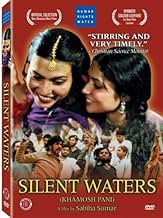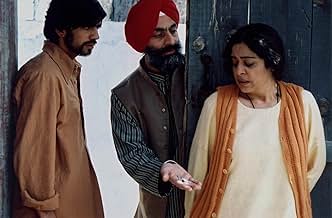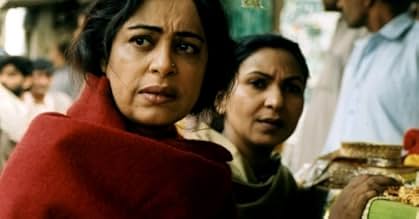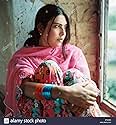IMDb रेटिंग
7.5/10
1.3 हज़ार
आपकी रेटिंग
अपनी भाषा में प्लॉट जोड़ें1979. A village in Pakistan. A widow sees her 17 years old son being attracted to Islamist militants. It brings her past back.1979. A village in Pakistan. A widow sees her 17 years old son being attracted to Islamist militants. It brings her past back.1979. A village in Pakistan. A widow sees her 17 years old son being attracted to Islamist militants. It brings her past back.
- पुरस्कार
- 8 जीत और कुल 2 नामांकन
Aamir Ali Malik
- Saleem
- (as Aamir Malik)
Navtej Singh Johar
- Jaswant
- (as Navtej Johar)
Arshad Mahmood
- Mehboob
- (as Arsad Mahmud)
Fareeha Jabeen
- Shabnam
- (as Fariha Jabeen)
फ़ीचर्ड समीक्षाएं
'Silent Waters'is consciously designed to be an issue-based movie. The subject seemed to follow a certain pattern in which women took the center stage in the narrative. Though, there were parallel tracks as well, but it was a perception developed out of simple observation, and not because there was any particular ideology to propound.
The film is based on actual events that took place when the Indian sub-continent was partitioned in 1947 into two new states - India and Pakistan. It was a time of intense violence. In pre-partition Punjab, Muslims and Sikhs had lived side-by-side, but during the partition men from both sides of the religious divide slaughtered each other. Each looted the other's property, which included their respective women: little distinction was made between robbing cattle and abducting women. Muslim men abducted Sikh women while Sikh men abducted Muslim women. The women were raped, bought, sold and, sometimes, murdered; some ended up marrying their abductors.
This film has a definite Punjabi feel, set on the borders of Pakistan in 1979 - the year that president Zia Ul-Haq introduced Islamic laws into what was meant to be a secular country.
Silent Waters is chillingly humane drama that will stay with you for a long time.
The film is based on actual events that took place when the Indian sub-continent was partitioned in 1947 into two new states - India and Pakistan. It was a time of intense violence. In pre-partition Punjab, Muslims and Sikhs had lived side-by-side, but during the partition men from both sides of the religious divide slaughtered each other. Each looted the other's property, which included their respective women: little distinction was made between robbing cattle and abducting women. Muslim men abducted Sikh women while Sikh men abducted Muslim women. The women were raped, bought, sold and, sometimes, murdered; some ended up marrying their abductors.
This film has a definite Punjabi feel, set on the borders of Pakistan in 1979 - the year that president Zia Ul-Haq introduced Islamic laws into what was meant to be a secular country.
Silent Waters is chillingly humane drama that will stay with you for a long time.
This is an outstanding movie, illustrating life in rural Punjab in Pakistan and how the ugly scepter of religious fundamentalism raises its head and disrupts the peaceful flow of village life under General Zia. At the every end, it refers to the current version of an old story under yet another General, Musharaf.
The central story is about Ayesha, a Sikh girl abducted and left behind during the Partition, who has made a new life for herself in Pakistan, being forced to take on a new identity, marrying one of her abductors, and raising a son she dotes upon. The return of her long lost brother as a pilgrim and the taking over of the village by fanatics ends up destroying the life she had created. Kirron Kher in the lead role is very good and all the actors do a great job.
My only concern is that viewers without a close understanding of the India Pakistan Partition may miss out some of the subtleties. That however did not stop the judges at a European film festival from awarding the best actress prize to Kirron Kher.
The central story is about Ayesha, a Sikh girl abducted and left behind during the Partition, who has made a new life for herself in Pakistan, being forced to take on a new identity, marrying one of her abductors, and raising a son she dotes upon. The return of her long lost brother as a pilgrim and the taking over of the village by fanatics ends up destroying the life she had created. Kirron Kher in the lead role is very good and all the actors do a great job.
My only concern is that viewers without a close understanding of the India Pakistan Partition may miss out some of the subtleties. That however did not stop the judges at a European film festival from awarding the best actress prize to Kirron Kher.
This amazing picture is undoubtedly a statement on the never-ending religious war that has become a sad but integral part of history. Terrible to see how people are not allowed to live their life in peace, so much that some of them are forced to change their primary identity in order to survive. This story takes place in 1979 in the village of Charkhi, Pakistani Punjab, where middle-aged widow Ayesha lives a poor lifestyle with her 18-year-old son Saleem. She makes a living from her late husband's pension and by teaching the Quran to young girls. Her son Saleem is a handsome, simple and likable guy who is in love with a young girl named Zubeida. But soon starts the trouble, when Saleem suddenly gets involved with a group of Islamists. He breaks up from Zubeidaa, and Ayesha is frightened to see her son turning into an extremist, as this brings her past back and reminds her of a secret which has haunted her for years, a secret of which even Saleem is unaware. Painful flashbacks to the violent Partition hint, with a woman standing on the well's edge, are heartbreaking. One brave woman chose to live, but now circumstances take her back to this very damned well, to complete the uncompleted.
Khamosh Pani is a film evidently made with passion and sincerity. It is brilliantly directed and acted. The story is one of its kind, and the execution is superb. The dialogues are very well-written and the film is benefited by a wonderful background score. Sabiha Sumar skillfully captures the dim atmosphere of the Pakistani Punjab, and the quiet, sombre narrative style effectively symbolises the silent waters it deals with. The power of this film seems to come not only from the realistic way in which it was depicted and the honesty with which its issue was handled, but equally from the roundly excellent acting. Sumar's cast, which consists mainly of Indian actors, is led by one of the finest actresses in India, Kirron Kher. Kher is outstanding as the struggling, strong and tormented Ayesha, and infuses her role with depth and pathos very few actresses would be able to. Aamir Malik is convincing as Saleem, and his character's transformation from a carefree romantic fool to a decisive Islamist is well done. Shilpa Shukla is lovely as Zubeidaa but she mostly shines in the film's last scene.
To sum it up, Khamosh Pani is one exceptional piece of art. The many ironies it conveys are horrifying but simple. The film's last few sequences are deeply moving and touching. One scene (you will know what I am talking about) is really poignant. I highly recommend you to see this film.
Khamosh Pani is a film evidently made with passion and sincerity. It is brilliantly directed and acted. The story is one of its kind, and the execution is superb. The dialogues are very well-written and the film is benefited by a wonderful background score. Sabiha Sumar skillfully captures the dim atmosphere of the Pakistani Punjab, and the quiet, sombre narrative style effectively symbolises the silent waters it deals with. The power of this film seems to come not only from the realistic way in which it was depicted and the honesty with which its issue was handled, but equally from the roundly excellent acting. Sumar's cast, which consists mainly of Indian actors, is led by one of the finest actresses in India, Kirron Kher. Kher is outstanding as the struggling, strong and tormented Ayesha, and infuses her role with depth and pathos very few actresses would be able to. Aamir Malik is convincing as Saleem, and his character's transformation from a carefree romantic fool to a decisive Islamist is well done. Shilpa Shukla is lovely as Zubeidaa but she mostly shines in the film's last scene.
To sum it up, Khamosh Pani is one exceptional piece of art. The many ironies it conveys are horrifying but simple. The film's last few sequences are deeply moving and touching. One scene (you will know what I am talking about) is really poignant. I highly recommend you to see this film.
I am at a loss of words after watching this one which is more than a film, it is an experience therefore, the only words in which this masterpiece can be described are adjectives-mind blowing, shocking, great in narrative and style, simple and subtle, poignant, brilliant exposition. Here is finally a movie, that shocks you, surprises you, questions you, slaps you, make you cry, shows you a mirror-to sum up evoke strong responses. The film finally succeeds in speaking a universal language. Here No sides are taken but just roots you to the middle of the premise. It touched the epic proportions of earlier masterpieces Garam Hawa and Tamas, based on partition issues. Though an influence of Iranian new wave cinema is seen on film maker sabiha sumer yet it is an original piece. A superior product, a touching tale, a classic world cinema, indeed.. "Jinhe naaz hai Black par wo kahan hain".
Khamosh Pani will go down in Pakistani history as the most important work of art and politic since the country's inception. The story documents the era (1979) of the CIA-assisted killing of the democratically elected prime minister Bhutto and the installation of fundamentalist dictator General Zia ul-Haq. The film chronicles the death of love and the birth of hate as part of a continuing cycle of violence that has besieged that part of the world. Religious intolerance, bigotry and ignorance are the fierce villains of the movie. The film has managed to humanize the tragedy of the Pakistani people's struggle with fanaticism and imported agendas. What I particularly love about this film, besides the fact that it is technically remarkable, is the fact that it does not glorify death or killing. This is not a Bollywood or Lollywood melodrama. Beautiful punjabi language script adds to the authenticity of this true-to-life cinema representation of the people of the land. This film is brave to acknowledge the atrocities of displacement; of the violence against Sikhs and against women that was part of the partition of India and Pakistan. Well acted, well written and extremely well directed. Bravo!
क्या आपको पता है
- ट्रिवियाIndian distributor Shringar Films initially intended to dub the film in Hindi for local release, but eventually decided to release it with its original Punjabi audio with English subtitles.
- कनेक्शनFeatured in Women Make Film: A New Road Movie Through Cinema (2018)
टॉप पसंद
रेटिंग देने के लिए साइन-इन करें और वैयक्तिकृत सुझावों के लिए वॉचलिस्ट करें
विवरण
- रिलीज़ की तारीख़
- कंट्री ऑफ़ ओरिजिन
- आधिकारिक साइटें
- भाषाएं
- इस रूप में भी जाना जाता है
- Khamosh Pani: Silent Waters
- फ़िल्माने की जगहें
- उत्पादन कंपनियां
- IMDbPro पर और कंपनी क्रेडिट देखें
बॉक्स ऑफ़िस
- US और कनाडा में सकल
- $7,384
- US और कनाडा में पहले सप्ताह में कुल कमाई
- $1,617
- 10 अक्तू॰ 2004
- दुनिया भर में सकल
- $7,384
इस पेज में योगदान दें
किसी बदलाव का सुझाव दें या अनुपलब्ध कॉन्टेंट जोड़ें























